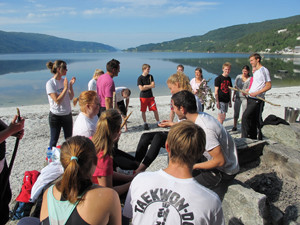The Inner Game of Taekwon-do

Astrid Kähler har delt følgende essay...
The «language» of Taekwon-do is foreign to me, in any connotation of the word. I don’t know the first thing about Korean, even though I over the years through two of my offsprings have been exposed to a fair share of yop cha jirugis, ap cha oligis, ap cha busigis and not to forget a whole bunch of momchau makgis. Fortunately, all merely in a literary sense. When it comes to the inner language; the history and background, the hows and whens and dos and don’ts, I am but an infant; interested, but still only vaguely aware of the contours of an unknown world.
The little I have gleaned has revealed an organization with strong emphasis on respect for authorities, i.e. anyone superior in “rank”, and reverence for the sport and its origin. “Standing” is signified by an easily deciphered dress code, at a glance identifiable for The Initiated, rendering it simple to do the right thing, e.g. bow in the right direction, at the right time to the right person.
The sense of respect so thoroughly permeates the atmosphere that even I on occasion have instinctively inclined my head along with everybody else, instantly afterwards shaking my head, wondering what the heck I’m doing.
The high ranked coaches are in TKd contexts confident, solemn, serious and strictly business looking. That, together with their physically fit stature, intuitively convinces you that these are people you want to stay on good terms with. Even though I have been informed time and again by “insiders” as to the human qualities of the above mentioned, I have always played it safe, staying at an arm’s length plus a little more, away from the in-attitude-Samurai-lookalikes.
All the greater was my surprise when I found myself as a Tkd-supporter on a bus with the national team and discovered other sides of the by me formerly perceived stoic personalities. Rarely have I seen so much fooling around, so much teasing, so many pranks and practical jokes, the majority of which carried out by the coaches behaving as mischievous kids , albeit with unusually brawny biceps and surprisingly husky voices.
And yet, once “the games began”, within the confines of the competition arena, the participants and leaders reclaimed their formal positions, neither ever in doubt as to the framework, characteristics or responsibility of their own role.
The event was an international one; much was at stake, nerves were on edge, tension was high, focus on the task at hand. Hope was in the air, as was anticipation and excitement, along with occasional despair, tears, nose bleed and a lot of sweat. Being a part of, but yet in many ways detached from it all, I had time and opportunity to observe people playing out their parts, both in the ring and between the matches.
It turned out that the competitions in many of the disciplines were going our way: feet kicking high and low, hitting their targets, determined hands punching powerfully, guarding skillfully, bringing “home” one medal after the other.
Of course, success was not had by all. Many had to swallow the bitter pill of defeat, either after a close call; coincidence, poor refereeing or a strong opponent determining the outcome, or due to not having performed according to their own potential or usual proficiency.
Never once, though, did I overhear a coach or anybody else utter a word of reproach; blaming, criticizing or condemning a match or a contestant.
On the contrary: Where praise was due, praise was given, where constructive observations were required, these were provided, where comfort was needed, a hug, a consoling arm around a shoulder, a wise word or funny comment often did the trick. Participants supported each other, behaving with empathy and dignity in the face of own or others’ win or loss. Self-pity or conceit were neither acknowledged nor accepted, and any sign of either dealt with by dealing a fitting remark or a joke.
I am still not “fluent” in the Taekwon-do “lingua”, and I don’t have the faintest idea of what is the correct response to a dollyo chagi or a sonkal malgi, or wether Maki is something to eat with wasabi sauce or guard myself against. It is beginning to dawn on me, though, the reason for the strong appeal and sense of belonging felt by the “do’ers”, their joy in performing their sport, their dedication to their club and each other, and the amazing perseverance shown year after year, both in sickness (injury) and in health.
If all the other martial arts clubs are in any way resembling the “spirit” of this particular group, the sports and their performers are in good shape. Not only sports wise, but also in preparing young people for the world outside the ring and the gym, teaching them to take care of, protect and respect themselves, their peers, their superiors and people of the world at large. The answer I got from the Master of Taekwon-do, the ahighest ranked in Norway, when I once asked him what he’d do if he met a provocative bully on the street, goes to show the actual peace seeking philosophy of taekwon-do: “If possible, I’ll turn around and run away as fast as I possibly can!” This coming from a man who could easily rearrange both the exterior and interior of most brutes. Now, that calls for respect!

